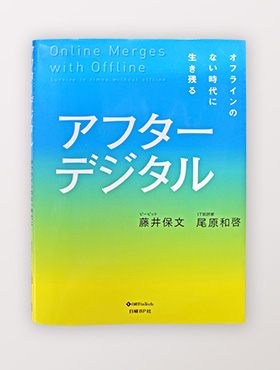


 Online Merges with Offline—
Online Merges with Offline——Survive in times without offlineWritten by Yasufumi Fujii and Kazuhiro Obara

Some books draw you in with the title; this is one such book.
Online Merges with Offline—Survive in times without offline reminds me of Being Digital written by Nicholas Negroponte and Brian Eno's album Before and After Science.
The name also gives a good idea of the content. Even so, you would be remiss to pass over this one; it needs to be read.
I read the first half before stopping. I stopped because, after the halfway point, I could pretty much tell what would follow. (I know that might sound a bit arrogant.)
I read the second half after actually meeting the writer, Yasufumi Fujii. I found talking with Mr. Fujii so stimulating that I was compelled to read the remainder of his book, which contains a wealth of valuable insight pertaining to the society and businesses of the future. It was truly an amazing read. (Thank you, Mr. Fujii!)
The central concept of the book is a shift from a pre-digital perspective to a post-digital one. This shift is as radical as the shift from believing that the earth is the center of the universe to recognizing that it revolves around the sun. A shift in perspective alters how one sees the world, and the ripple effect drives changes in our lives and in society. What can the shift in the perspective on the digital change? It could, for example, change how we look at the offline and physical world. Closer to home for MARUI GROUP, it could change the meaning of stores and customer service. The meaning of the online world will also change. The "quality and quantity data" that can be obtained through the Internet is changing at an accelerated pace, and the trend toward big data is transforming how data influences society and our daily lives. Accordingly, more important than the act of collecting data will be the purpose of collecting said data and the ends for which it is used. If you want more details on this matter, you will need to read the book. Its content goes beyond the scope of what I can discuss here. I recommend you read it twice and use a highlighter.
"A shift in one’s perspective is a massive undertaking. It is not enough to simply understand the concepts being explained; you must be able to act on them."
This is why a second read is essential.
This book expects us to shift our perspective, change how we see the world, and then shape and live in the new world we see. This process will require that we review, redefine, and rebuild everything that seemed matter-of-fact previously. For this reason, you will need to engage both with this book and with yourself. As you shift your perspective, you will need to constantly examine, through a process of self-inquiry, how the roles of the things around you change, how they can be redefined, and what value they can create. This process of self-inquiry is the ideal approach to reading this book. You might even want to arrange a book club. If all the participants bring the answers found in their self-inquiry process to the discussion, you might glean insights that could not be found alone, further broadening your perspective. In this manner, reading this book is not about understanding its content but rather about exercising its principles. A dialectic process of self-inquiry based on this book will no doubt drive positive changes in our lives and in society.
I would now like to recount a conversation I had with the writer, Mr. Fujii. I wanted to know what type of person could write such an amazing book and what their background was, so I asked. As a student, Mr. Fujii studied philosophy while playing music. I had anticipated the background in philosophy, but I was surprised to hear of his musical experience. When you think of it, however, music is often the gateway for changes in how we see the world. Philosophy then furnishes the framework for explaining that change. Another interesting part of this conversation was the response I got when I asked Mr. Fujii how he envisioned a smooth and enriching experience that realizes the merger of offline and online. He responded:
"It is close to playing an RPG like Dragon Quest."
This response opened my eyes, immediately granting me a clear vision of the post-digital world. As I recall, the famous artificial intelligence researcher Yutaka Matsuo also made an analogy using Dragon Quest in the past. The ambitions of the post-digital world and of artificial intelligence were to realize experiences like Dragon Quest in the real world.
- Online Merges with Offline—Survive in times without offline (Japanese only)
- Written by Yasufumi Fujii and Kazuhiro ObaraNikkei Business Publications, Inc.March 23, 2019
-
Purchase on Amazon
 Purchase on Rakuten Books (Japanese only)
Purchase on Rakuten Books (Japanese only)
- Hiroshi Aoi
- President and Representative Director
Representative Executive Officer, CEO

